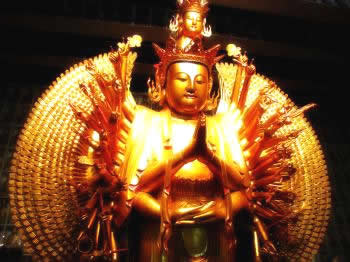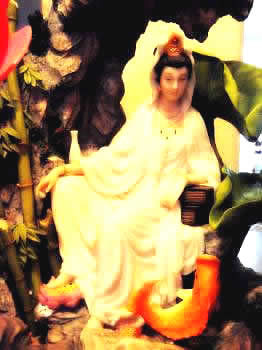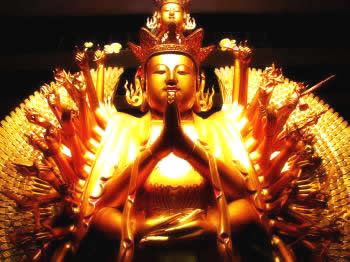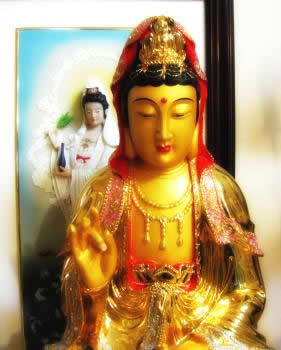 |
|
The Story of an Old Veteran
A talk given by Bhikshu Jin Yan on March 15, 2009
Welcome to the City of Ten Thousand Buddhas (CTTB) and Guan Shi Yin Bodhisattva's Birthday. Since there's a downturn in the economy, it is especially wonderful to see so many who have come from a distance for this special celebration. It takes a really sincere heart to be able to be here at this time. So some are here because they have received blessings from Guanyin Bodhisattva.

Some are here for the purpose of supporting and protecting the Bodhimanda. Still others are here because their friends encouraged them to make this kind of merit, and they listened and came to celebrate with everybody. No matter what the reason, we can know that we all have great affinities with Guanyin Bodhisattva, and that we have been aided by this Bodhisattva in life after life, either through his teachings or through his rescue. The Bodhisattva's great vows are the driving force behind numerous miracles and miracle stories that detail the Bodhisattva's deliverance of those who suffer endless difficulties.
Now I'd like to share a story with you that I heard from my father. Two or three years ago both my parents were still living in Dragon Tree House. My father taught in the Boys School and my mom helped out in Jyun Kang Restaurant. In his spare time, my father would sometimes go to the restaurant to help my mom out a little with her job. He would pick up the bowls and plates for dishwashing, for example, or wipe the tables. Once he happened to meet a customer there, a retired U. S. Navy veteran. They chatted a little, and as time went on, my father felt that the conversation was really pleasant and congenial. He was also quite intrigued by this old fellow, so much so that he invited him to Dragon Tree House to have a longer chat.
As the story of the old retiree unfolded, it turned out to be a very long and moving one: Actually, he was from New Orleans and a survivor of Hurricane Katrina in 2005. He had come to CTTB, my father learned, for the sole purpose of offering incense as a token of gratitude to Guan Shi Yin Bodhisattva for saving his life in the hurricane.
Born and raised in New Orleans, the man had joined the Navy when young. In time, he frequented both old Buddhist temples and new monasteries. He listened to and appreciated the chanting of the Buddhist monks. He learned the name of Guan Shi Yin Bodhisattva, along with some of the chants and invocations, including Guanyin Bodhisattva's Universal Door Chapter from the Lotus Sutra. He also became familiar with the Morning Recitation and Evening Recitation Ceremonies, etc. Because of such experiences he developed a genuine interest in Buddhism in general, and of chanting in particular, which planted Dharma-seeds in his mind.
Upon his return to New Orleans, the old veteran got married twice and had children from both marriages. So after going through two unhappy marriages and two divorces, he was so disheartened that he decided to change his lifestyle altogether. With two children gone off to college elsewhere, there was no impediment to his living by himself on a boat, so that's what he did, dropping anchor at the mouth of the Mississippi River. In time, he gave up many of the things he used to do, and began to live the life of a semi-recluse. Eventually, he happened upon the then newly-established Gold Dharma Monastery in New Orleans, where he quickly learned about Dharma Realm Buddhist Association and CTTB in Northern California.
Then, on August 31, 2005, the deadly, now famous Hurricane Katrina formed over the Gulf of Mexico, and quickly swept through the southern states of Alabama, Mississippi and Louisiana, especially devastating the city of New Orleans in Louisiana. They expected the storm to wreak such havoc that the city government of New Orleans quickly shut down the incoming lanes of the two-way Interstate Expressway 10 and made all lanes outgoing. That is to say, all lanes became one-way out, towards Houston, Texas to the West. So those who could do so jumped into their cars and drove away as fast as they could. Some people, however, chose to stay rather than to run, being either too old, or too attached (whether to homes, or businesses, to others, or to livelihoods). For whatever reasons, some refused to leave, including the old veteran, while others just left their lives to fate, hoping to be spared.
During the long days and nights of waiting out the hurricane, the old veteran became so worried that he couldn't sleep. One midnight, the turbulence became so great that he was determined to find his way to the riverbank, but it was too late. His boat capsized, trapping him under the heavy bulk of the hull, and he couldn't make his way free. "This," he thought, "is it. The end. It's all over now." No matter how he struggled to free himself, he couldn't do it. Finally, he closed his eyes in despair to await his fate. His whole life flashed like a slideshow before his eyes, including the years of military service in Asia. Suddenly, he heard the familiar chanting sounds of Guan Shi Yin Bodhisattva's name and of the Universal Door Chapter echo clearly in his mind. Unconsciously, with utter sincerity, he let his mind follow the chanting sounds, forgetting that he was a dying man in a storm. Then, he felt a huge wave approach, and it hit the boat, and he got knocked unconscious. When he came to, he discovered that the boat had righted itself and that he was back on deck again, and safe. Strange as it was, he was only more frightened than hurt, and he was safe, and alive.
Even though the old veteran doesn't consider himself a Buddhist, he nevertheless decided to come to CTTB to offer incense in gratitude to Guan Shi Yin Bodhisattva, whom he figures saved his life during Hurricane Katrina.
So you have just heard a rough version of the story of the old veteran who visited CTTB and my father. With his deep compassion and kindness, Guan Shi Yin Bodhisattva rescues beings in this Saha World, while we ourselves rarely even know enough to wake up from our dreams. Rather, we suffer one difficulty after another. In fact, very few of us know to recite the name of Guan Shi Yin Bodhisattva during times of trouble or difficulty.
The Bodhisattva regards all beings equally and impartially, seeking nothing in return; he is ever-ready to extend his helping hand. As for us, though, don't we owe the Bodhisattva a debt of gratitude every time we receive his help? Although we know that the Bodhisattva isn't a "Bean Counter" and doesn't think in terms of keeping accounts, still, over time, will our conscience be clear if we're always on the receiving end only? From this we can understand why there are so many devotees who go on pilgrimage to Mount Potola in Zhejiang Province in China.
How can we repay the kindness of the Bodhisattva? We can discuss this further. For one thing, we can know and understand that if we can really end birth and death, then we are truly repaying the kindness of the Bodhisattva. How? By saving him a lot of time and trouble. Not only that, but also we are helping the cause of world peace, helping to make a more peaceful nation, and improving the lot of our fellow citizens. Venerable Master Hua once said that a single person can help the entire world when he brings forth a solid and true resolve to cultivate the Way. So I hope that all of you will work hard on your cultivation, sincerely recite the name of Guan Shi Yin Bodhisattva, and seek rebirth in the Land of Ultimate Bliss of Amitabha Buddha. Then, one day you can return to this Saha World and be a T.A.(teaching assistant) for Guanyin Bodhisattva and help him teach and transform living beings.

Finally, I have one more thing to say, to encourage people. Over the years, there have been numerous stories generated as a result of responses people have had from worshipping Guanyin Bodhisattva, and some of these stories have been published. For example, one of the most popular and detailed books on the Bodhisattva's response stories is called Nanhai Putuoshan Chuanqi Yiwenlu (Legendary Stories from Mount Potola of the South Sea), compiled by Great Master Zhu Yun. Many of the stories occurred during the 1920's and '30's in the early days of the Republic of China.
Decades have passed and now we are in the Americas, so we should have an American book that details the salvific stories of Guanyin Bodhisattva in America. The book can be called Records of Mount Potola (American Version). With such a book we will be able to encourage our own offspring and future generations by passing down an important document and account in the annals of Buddhism. So, we hope that those who have received the aid of Guanyin Bodhisattva can manifest and reveal their stories – can speak their Dharma – so that these true stories can be kept, recorded and compiled. Those with good literary skills can help, as well as others who may wish to contribute their talents and support.


